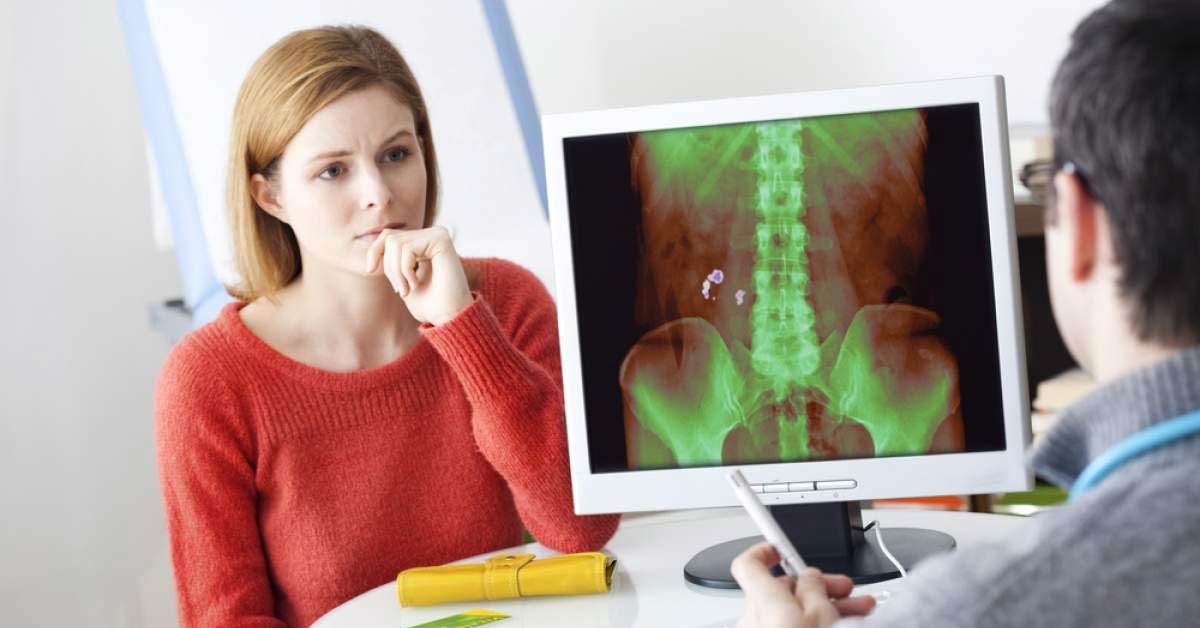

About half a million people each year visit emergency rooms because of kidney stones.
Kidney Stones Symptoms include back and side pain (also called flank pain) that can come in waves, an urgent need to urinate, burning with urination, blood in urine, nausea, and vomiting. For many, kidney stones are a lifelong problem.
Kidneys are essential for maintaining the body’s fluid and chemical levels, filtering waste from blood, and removing it through urination. Kidney stones can interrupt that process, causing blockages, swelling, and pain in your urinary system. If you’ve ever passed a kidney stone, you know how painful it can be.
Here are eight other facts you should know about kidney stones:
1. Kidney stones are formed from minerals and salts in urine. Normally, those minerals and salts are dissolved in water and excreted during urination. Sometimes they clump together instead, forming small stones. Kidney stones usually range in size from small as a grain of sand to as large as a pea. They can be larger, however. Small stones can usually pass in urine. Stones too large to pass may need to be removed using sound waves or surgery.
2. You might not even know you have kidney stones. If a stone stays in the kidney, you might not have any symptoms. If it moves down the urinary tract instead, a kidney stone can get stuck and block the flow of urine. It becomes painful at that point, and very obvious that something is wrong that might require medical attention.
3. Kidney stones have many causes, including genetics, dehydration, diet, bowel conditions or surgeries, obesity, certain medical conditions, or even certain medications and supplements.
4. Treatment depends on the type of stone, its size, where it’s located, and how long you’ve lived with symptoms. There are four main types of stones – calcium-based, uric acid, struvite, and cystine. Treatments can range from drinking water and pain medications for stones small enough to pass in urine, to surgery for stones too large pass.
5. Certain lifestyle choices can help prevent kidney stones. Eating a healthy diet, drinking plenty of water, and reducing salt intake can help keep stones from forming.
6. A heart-healthy diet, like the DASH plan (Dietary Approaches to Stop Hypertension), can prevent kidney stones, too. Eating fruit, vegetables, whole grains, fish, low-fat dairy, and lean proteins – while limiting saturated fats, salt, and sugar – benefits your entire body.
7. Kidney stones are more common in hot weather because of the greater risk of dehydration. Heat and humidity can cause you to lose more fluid than you take in. By the time you notice feeling thirsty, you’re already dehydrated. Drinking water is especially important in the heat.
8. Nearly 1 in 10 people will have a kidney stone at some point in their life, and more of those will be men than women.
If you think you have a kidney stone, it’s important to get medical attention right away. The pain you feel is a sign that urine is backing up in your urinary tract. That can cause an infection or more severe complications.
more recommended stories
 Pediatric Crohn’s Disease Microbial Signature Identified
Pediatric Crohn’s Disease Microbial Signature IdentifiedKey Points at a Glance NYU.
 High-Fat Diets Cause Damage to Metabolic Health
High-Fat Diets Cause Damage to Metabolic HealthKey Points Takeaways High-fat and ketogenic.
 Can Too Many Antioxidants Harm Future Offspring?
Can Too Many Antioxidants Harm Future Offspring?Key Takeaways High-dose antioxidant supplementation in.
 Human Antibody Drug Response Prediction Gets an Upgrade
Human Antibody Drug Response Prediction Gets an UpgradeKey Takeaways A new humanized antibody.
 Dietary Melatonin Linked to Depression Risk: New Study
Dietary Melatonin Linked to Depression Risk: New StudyKey Summary Cross-sectional analysis of 8,320.
 Type 2 Diabetes Risk Identified by Blood Metabolites
Type 2 Diabetes Risk Identified by Blood MetabolitesKey Takeaways (Quick Summary) Researchers identified.
 Microglia Neuroinflammation in Binge Drinking
Microglia Neuroinflammation in Binge DrinkingKey Takeaways (Quick Summary for HCPs).
 Durvalumab in Small Cell Lung Cancer: Survival vs Cost
Durvalumab in Small Cell Lung Cancer: Survival vs CostKey Points at a Glance Durvalumab.
 Rising Chagas Parasite Detected in Borderland Kissing Bugs
Rising Chagas Parasite Detected in Borderland Kissing BugsKey Takeaways (At a Glance) Infection.
 Can Ketogenic Diets Help PCOS? Meta-Analysis Insights
Can Ketogenic Diets Help PCOS? Meta-Analysis InsightsKey Takeaways (Quick Summary) A Clinical.

Leave a Comment